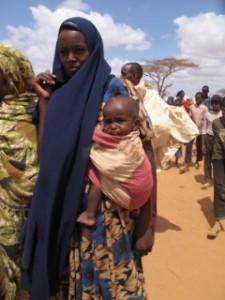September 2012
 East Africa Faces Catastrophic Drought
East Africa Faces Catastrophic Drought
Since July 2011, East Africa has been suffering from a drought that has been called, “the most severe humanitarian emergency in the world.” 1 Heart-wrenching reports have compelled Work for All to ramp up our contributions to both Plan and The United Nations Development Programme (UNDP). Both of these groups are working to help alleviate the strife in this region.
Here are some of the reports coming out of East Africa at this time:
– “More than 13 million people are struggling to survive and are in need of urgent, lifesaving humanitarian assistance” – CARE
– “One in three children is acutely malnourished” – UNICEF
– “One in ten children is at risk of starving to death” – Red Cross
– “About 500,000 children are at risk of being separated from their parents in Somalia” – World Vision
-“Women, many of them mothers with children, are arriving with stories of rape, violence and hunger” – CARE
– “Child labor is more common, and what we’ve seen in many emergency situations is children taking dirty, dangerous and degrading jobs.” – World Vision
Work for All continues to support the UNDP, who report that the number of people caught in this crisis has recently increased to 1.6 million (as of July 28, 2012) and is expected to continue rising in the coming months.
Through your generous contributions, Work for All also supports Plan as they reach out to the weak and vulnerable in East Africa. Clean water sources and reliable food supply is paramont in aiding the influx of refugees in the region. Protecting children and educating families can only be accomplished through much-needed funding. Thank you for partnering with us. – Melissa Lopes
GLOBAL POVERTY REQUIRES GLOBAL ACTION
The developed part of the world is struggling with a high unemployment (8.6 % in 2011). If we need jobs, does that mean we need to be motivated to do something productive? We only spend 4% of our effort on food, and what we produce with the other 96% of our economy is often of dubious value.
Conversely, the underdeveloped world is struggling with a lack of basic necessities. What does a developed world baby have, when she or he is born, that the underdeveloped world baby does not have? Infrastructure! Not to mention, a reasonably homogeneous society with rules that most of us agree to live by.
We should focus on building power plants, schools, roads, hospitals, water treatment plants and sewage treatment plants, where they are needed. If all of us take responsibility for providing a minimum standard of infrastructure for all the world, it would provide jobs as well as create infrastructure where it is needed most.
– Jeremy Leonard
